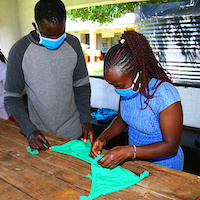A conversation worth joining
19 September 2013
You’ve probably read, on these and other development-focused pages, about The World We Want. It’s a platform created by the United Nations and civil society. Its aim is to make people's voices heard in the process of building a global agenda for sustainable development. How does it do this? Well, one way is the World We Want ‘People’s Voices’ series of discussions. This extends the theme of making voices heard; it aims to ensure that people themselves continue to have a strong voice, but specifically in the post-2015 process. Why post-2015? Because in 2000, world leaders promised to halve extreme poverty by 2015 with a global plan called the Millennium Development Goals (MDGs). And there has been progress - notably in alleviating poverty and ensuring access to better drinking water - but hundreds of millions of people are still hungry, poor or ill from preventable causes. The World We Want is part of a global conversation that will influence the work of the UN and, it is hoped, world leaders when they plan for the period after 2015. Which brings us back to the People’s Voices Series. Peace, Poverty and the Post-2015 Development Agenda was the theme of the World We Want Platform’s third event in the series. Themes such as inclusion, participation and dialogue were addressed, as you can see (and hear) at http://www.worldwewant2015.org/node/392436. It’s interesting to note that, as the accompanying press release puts it, in the recent People’s Voices event “a constant question from the audience and online was how to ensure that people’s voices are heard as we discuss violence and conflict for the post-2015 negotiations”. Of course, inclusion of the voices of people who may have been marginalised is what initiatives like The World We Want are trying to address, but it’s still a question that needs to remain at the forefront of everyone’s thinking. People’s Voices events have discussed or will soon discuss not just peace but disability, poverty, corruption and the needs of children. You can find out more at the World We Want site (http://www.worldwewant2015.org) and the People Voices page (http://www.worldwewant2015.org/PeoplesVoices). In fact on that page you can participate online. You can even apply to become a World We Want Influencer. It’s a conversation, of course, rather than direct policymaking but it is a conversation that could eventually inform policies worldwide - and that makes it a conversation worth joining.

